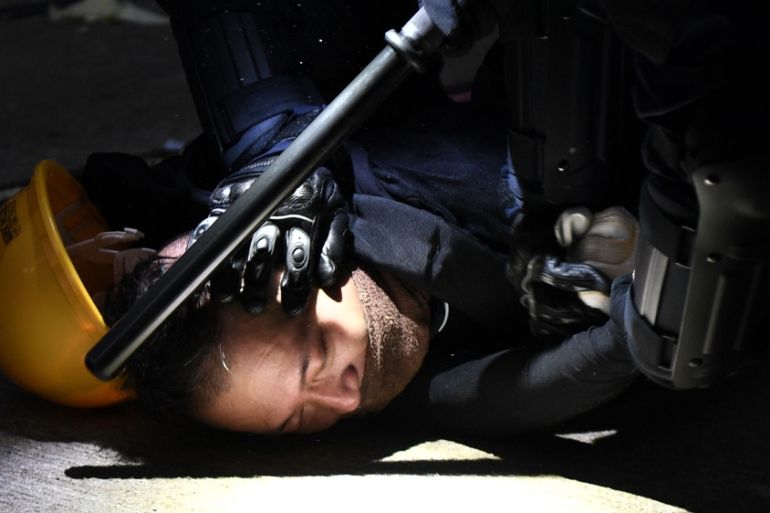Hong Kong protester shot in the chest by police during clashes
It is the first such injury from a live round in months-long protests against pro-Beijing city administration.

A Hong Kong pro-democracy protester has been shot in the chest after a police officer opened fire during clashes on Tuesday, as China celebrated the 70th anniversary of the communist-led government in Beijing.
The incident was the first time a protester has been shot, in an escalation of the months-long unrest that has rocked the city.
Keep reading
list of 4 itemsThe Take: Where are Hong Kong’s protesters now?
Hong Kong’s new security law comes into force amid human rights concerns
Hong Kong passes tough new national security law
Al Jazeera’s Sarah Clarke, reporting from Hong Kong, said the 18-year-old protester was in “critical condition” undergoing emergency surgery at hospital.
A video of the incident, shot by the City University Student Union and shared on social media, showed a dozen black-clad protesters hurling objects at a group of riot police pursuing them. Television channels also showed footage of the incident.
In the video, one officer, who is surrounded, draws his revolver and points it at the group. He fires and one protester collapses on the street while others flee.
“Live ammunition has been used as a warning shot before, only once, or potentially twice, but this is the first time that live ammunition has been used on a protest,” Clarke said.
Police addressed the shooting and called on rioters to stop “illegal acts”.
“A large group of protesters were attacking police officers, despite warnings from the police,” Yolanda Yu Hoi-Kwan, police senior superintendent, told a press conference.
“The police officers lives were under serious threat; to save his own life and his colleagues’ lives, he [police officer] fired a live shot … and one 18-year-old man was shot [and] his left shoulder area was injured.”
Street clashes
During the day, protesters spray-painted slogans aimed at the government, such as “Topple the Commies” and “Communist China, go to hell”, before street battles broke out in several neighbourhoods across the city, including ones near the government office headquarters.
Riot police repelled protesters with rounds of tear gas shells. A smattering of demonstrators hit back with Molotov cocktails, but most huddled behind a patchwork shield of umbrellas in non-violent self-defence.
In one neighbourhood far from downtown, the police fired at least another round into the air.
Over the past 16 weeks, Hong Kong has been in the throes of anti-government protests – triggered by a proposed bill that would have allowed the extradition of accused individuals to mainland China for trial – that have since morphed into a wider movement for democracy.
Demonstrators are also demanding an independent inquiry into alleged police brutality in suppressing the protests, blanket amnesty for all those charged with offences stemming from participating in demonstrations, and a retraction of police claims that protesters are guilty of rioting – a charge that carries a heavy prison sentence.
The protesters also want to be able to elect Hong Kong’s top leader and all its legislators.
‘Not feeling Chinese’
A former British colony, Hong Kong was returned to China in 1997 under a ‘one country, two systems’ framework, which guaranteed Hong Kong people rights and freedoms largely absent in mainland China.
However, in recent years, critics say Beijing has increasingly interfered in the territory and resentments have bubbled to the surface.
In some neighbourhoods on Tuesday, demonstrators scattered paper offerings meant for the deceased in front of businesses operated by the Chinese government, such as China Travel Services.
Over the past 10 years, the number of Hong Kong people who took pride in being Chinese has gone down significantly, according to a survey conducted in June by the University of Hong Kong’s Public Opinion Programme.
The survey showed a record high number of respondents describing themselves as residents of Hong Kong and a record low of those identifying themselves as Chinese citizens.
Among those under age 30, the percentage of respondents identifying as Chinese is in the single digit.
Additional reporting by Violet Law from Hong Kong